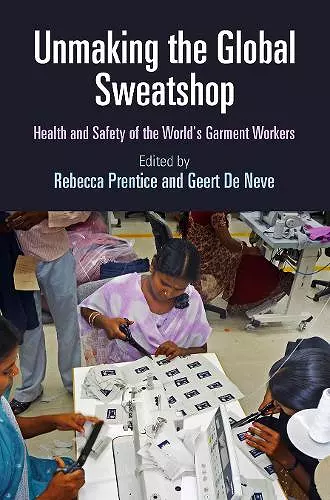Unmaking the Global Sweatshop
Health and Safety of the World's Garment Workers
Geert De Neve editor Rebecca Prentice editor
Format:Paperback
Publisher:University of Pennsylvania Press
Published:8th Oct '24
Should be back in stock very soon

Unmaking the Global Sweatshop gathers the work of leading anthropologists and ethnographers studying the global garment industry's impact on workers' well-being and examines the relationship between the politics of labor and initiatives to protect workers' health and safety.
Anthropologists and ethnographers examine the global garment industry's impact on workers' well-being
The 2013 collapse of Rana Plaza, an eight-story garment factory in Savar, Bangladesh, killed over a thousand workers and injured hundreds more. This disaster exposed the brutal labor conditions of the global garment industry and revealed its failures as a competitive and self-regulating industry. Over the past thirty years, corporations have widely adopted labor codes on health and safety, yet too often in their working lives, garment workers across the globe encounter death, work-related injuries, and unhealthy factory environments. Disasters such as Rana Plaza notwithstanding, garment workers routinely work under conditions that not only escape public notice but also undermine workers' long-term physical health, mental well-being, and the very sustainability of their employment.
Unmaking the Global Sweatshop gathers the work of leading anthropologists and ethnographers studying the global garment industry to examine the relationship between the politics of labor and initiatives to protect workers' health and safety. Contributors analyze both the labor processes required of garment workers as well as the global dynamics of outsourcing and subcontracting that produce such demands on workers' health. The accounts contained in Unmaking the Global Sweatshop trace the histories of labor standards for garment workers in the global South; explore recent partnerships between corporate, state, and civil society actors in pursuit of accountable corporate governance; analyze a breadth of initiatives that seek to improve workers' health standards, from ethical trade projects to human rights movements; and focus on the ways in which risk, health, and safety might be differently conceptualized and regulated. Unmaking the Global Sweatshop argues for an expansive understanding of garment workers' lived experiences that recognizes the politics of labor, human rights, the privatization and individualization of health-related responsibilities as well as the complexity of health and well-being.
Contributors: Mark Anner, Hasan Ashraf, Jennifer Bair, Jeremy Blasi, Geert De Neve, Saydia Gulrukh, Ingrid Hagen-Keith, Sandya Hewamanne, Caitrin Lynch, Alessandra Mezzadri, Patrick Neveling, Florence Palpacuer, Rebecca Prentice, Kanchana N. Ruwanpura, Nazneen Shifa, Dina M. Siddiqi, Mahmudul H. Sumon.
"A first-rate and necessary book. In compiling the analyses of northern and southern scholars across the social sciences, Unmaking the Global Sweatshop provides original insights into the global supply chain and innovative approaches to general questions of power relationships and workers' health and safety writ large." * Lance A. Compa, Cornell University *
"Using the unifying theme of health and safety, the editors open a wide-ranging study of power relations in the supply-chain system and on factory floors. Each chapter brings a unique perspective to these issues and provokes new ways of thinking about them." * Susan L. Kang, City University of New York *
ISBN: 9781512826937
Dimensions: unknown
Weight: unknown
304 pages